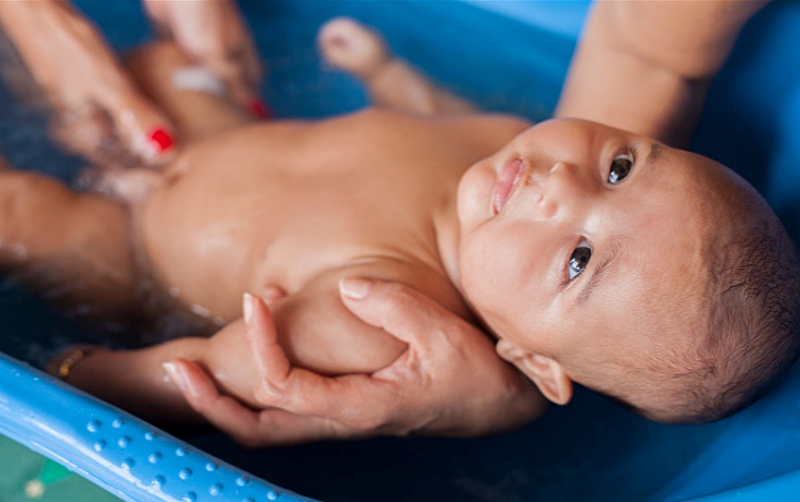How warm should a baby bath be? The water should be comfortably warm, not hot. You can test the temperature by dipping your elbow or wrist into the water – it should feel like a comfortable bath for you. If it’s too hot for you, it’s too hot for the baby!
Some parents use a thermometer to check the water temperature, but this is not necessary if you’re using comfortably warm water. Remember that babies lose heat quickly, so don’t let the tub get too cool while the baby is bathing. Keep an eye on the water temperature and adjust as needed.

What time is too late to bathe a baby?
There is no definitive answer to this question as it will depend on the baby’s age and individual preferences. Generally speaking, however, most doctors recommend giving a baby their first bath sometime between two and four days old.
Some parents may choose to wait until their baby is a bit older, especially if they are born prematurely, while others may choose to bathe their newborn sooner if they have a particularly dirty diaper or are covered in birth fluid. Ultimately, it is up to the parents to decide what time works best for them and their children.
Some babies hate getting baths and will fuss and cry throughout the entire process, while others seem to enjoy it. If your baby falls into the latter category, you may find yourself wanting to bathe them every day!
Does baby bathwater need to be boiled?
The answer to this question is no, baby bath water does not need to be boiled. Boiling the water can be dangerous for your child. The American Academy of Pediatrics recommends that you use room temperature or warm water when bathing your baby.
If you live in a cold climate and find that your home’s water is too cold, you can place the container with warm water on a radiator or heater to heat it before bathing your baby. You should never leave your child unattended in the bathtub, even if you are using warm tap water. Always test the temperature of the water with your elbow before putting your child in the tub.
If necessary, add a small amount of mild soap to the water to create suds. Gently wash your baby from the top of their head to their toes, using a soft cloth or sponge. Be sure not to get any soap in your child’s eyes. Rinse your baby thoroughly with warm water after each bath.
Once you are finished bathing your child, wrap them in a towel and gently pat them dry. DO NOT use harsh detergents or fabric softeners on your baby’s skin – these can be harmful. Instead, use a fragrance-free moisturizing lotion to keep their skin healthy and soft.
How do I know if my baby’s bath is too hot?
It can be difficult to tell if the bathwater is too hot for your baby. The best way to make sure the water isn’t too hot is to test it with your elbow or wrist. If you can’t hold your hand in the water for more than a few seconds, the water is too hot.
If you’re using a thermometer to check the temperature of the bathwater, aim for a temperature of around 100 degrees Fahrenheit. You can also run some cold water into the tub before adding any warm water so that it’s not too hot when your baby gets in. Don’t use bubble baths or other additives in your baby’s bath, as these can make the water dangerously hot.
When bathing your baby, always stay within arm’s reach. Never leave your baby unattended in the bath, even for a few seconds. If you need to answer the phone or door, take your baby with you.
If your baby is under six months old, give him or her only sponge baths until his or her umbilical cord stump falls off and the navel heals. After that, you can give your baby a tub bath once a week. Be sure to use plain water—no soap—and rinse your baby well afterwards.
Always dry your baby completely after bathing, using a soft towel. Babies can catch a chill very easily, so be especially careful to keep them warm after their bath. You may want to dress your baby in a warm sleeper or blanket after the bath.
Do baths help the baby sleep??
Baths can help babies to sleep, but only if they are given at the right time of day. Baths should not be used as a means of putting a baby to sleep, as this can backfire and make it difficult for the baby to fall asleep later on.
A bath before bedtime may help relax your baby and prepare them for sleep, but avoid bathing your baby too late in the evening or they may not be able to stay asleep through the night.
The best time to bathe your baby is usually shortly after they have woken up from their nap or when they are calm and relaxed. This will help them associate baths with relaxation and calmness, which can lead to better sleep habits overall.
